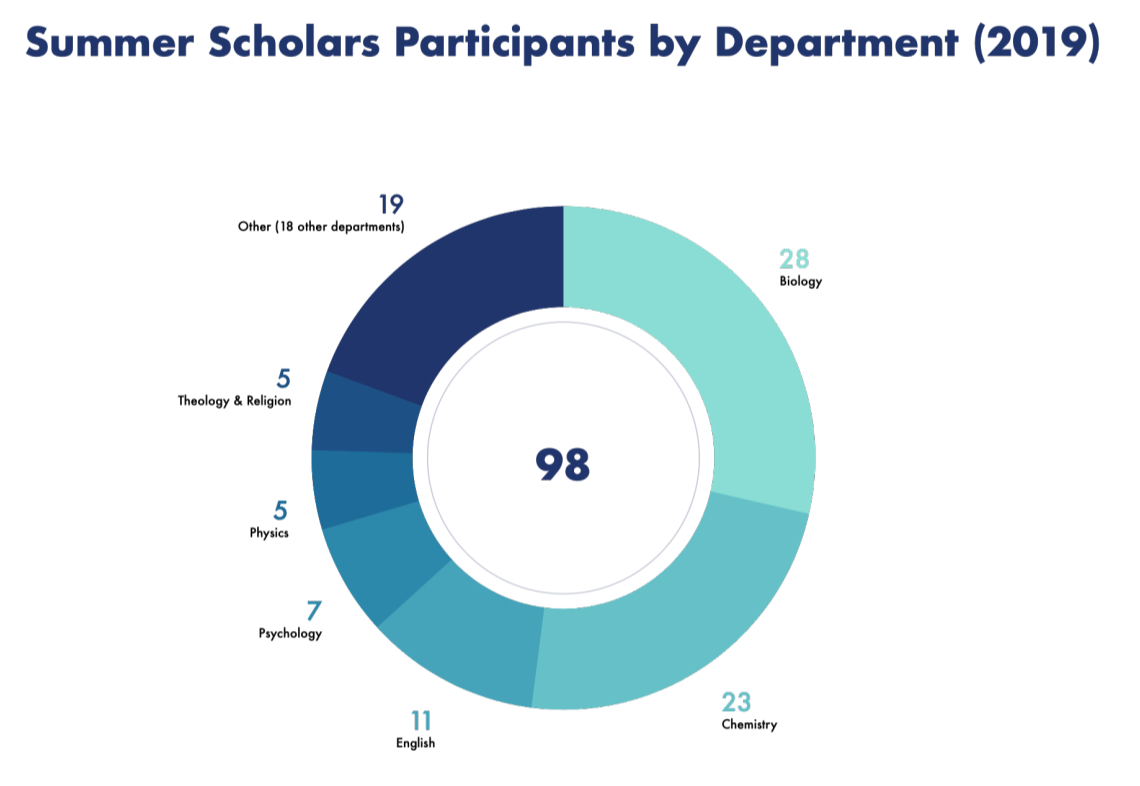Department chairs in the College of Arts and Sciences (CAS) were told in a meeting late last month that funding for the Summer Scholars Program would be “seriously diminished” this year due to “austerity.”
The Summer Scholars Program provides St. Joe’s undergraduate students with the opportunity to participate in faculty-mentored research, creative writing and other scholarly endeavors during the summer break, according to the Summer Scholar Program’s website. This year scholars will receive a $3,200 stipend and, if living on campus, subsidized housing.
When asked about funding for the program, Shaily Menon, Ph.D., dean of the CAS, confirmed the budget will be “on the lower side” for summer 2020. But she said this year’s budget is not yet finalized.
Applications for the program were due Feb. 3. By that date, each applicant needed to have chosen a faculty mentor and researched and written a project proposal. Academic departments review proposals later this month, along with members of the Summer Scholars Committee.
Applicants are notified of the status of their application March 9. In the past three years, the Summer Scholars Program has received anywhere from 70 to 90 applications with only a “handful not accepted,” according to Gail Benner, director of PR and Media.
When asked about funding reductions for this summer’s program, Benner said in an email to The Hawk, “It’s too early to know because the University is still fundraising for the program.”
The Summer Scholars Program originated from a grant awarded in 1994 to the biology department from the Howard Hughes Medical Research Institute. Due to the program’s popularity, the university committed an additional $100,000 to the program in 2005. The current iteration of the program, which invites students from all majors across all three schools to apply, launched in 2006.
However St. Joe’s commitment to the program fluctuates year by year, Menon said, due to changes in the university’s budget. Donor commitment can fluctuate as well.
“A donor may have said, ‘I pledge to support this for five years,’ and then they may or may not renew it,” Menon said.
Menon said she has been working to obtain “separate funding” for the program so it can have a more “stable base.”
Menon said ideally the university would create an endowment for the program.
“An endowment takes a long time to build up because it has to reach a certain amount and then you get 4 % or so drawn out,” Menon said. “We’re working toward that, but that’s going to be a while. We’re counting on somebody to have pledged something.”
Paul Angiolillo, Ph.D., interim dean for Research, Facilities and Professional Development, oversees the Summer Scholars Program and has a role in managing the budget of the program.
“The way the funding has evolved has been a mixture of institutional funds and private donor funds,” Angiolillo said. “So again, through the advancement process here, we’re always looking for outside donors.”
While the Summer Scholars Program budget is allocated and managed by CAS, Joseph DiAngelo, Ed.D., dean of the Ervian K. Haub School of Business, said the business school has sometimes “supplemented the budget out of the business school budget.”
“Sometimes when we get more students who are from the business school than we normally get, we have funded some, and some of the departments have as well if they have funds,” DiAngelo said.
DiAngelo added business students have also received additional support to travel to conferences to present their Summer Scholars projects.
David Allan, Ph.D., professor and chair of the marketing department and a Summer Scholars faculty mentor, said the program takes the student experience to a “whole other level,” no matter what school or department a student is in.
“It drives home the whole Jesuit experience when you are with a professor instead of learning by a professor, in spite of a professor, because of a professor, all that kind of stuff,” Allan said.
Bella Succi ’20, a Summer Scholar in 2018, conducted research on sleep deprivation in mice with Jennifer Tudor, Ph.D., assistant professor of biology. Succi said the stipend students receive is important because a lot of students can’t afford to take an unpaid internship.
“For most people, the summer is when they make the most money for the school year,” Succi said. “For us to be able to get all that learning experience and get a stipend, it’s a way to make money and still get that experience.”
Menon acknowledged the value of the Summer Scholars Program and called it a “real priority.”
“There are things called high-impact practices, experiential learning for students beyond the classroom that data has shown to be very important for students in their success while they’re at university and also beyond that in grad school or in jobs and careers,” Menon said. “There are many examples of hiring practices, internships, co-ops, study abroad, but undergraduate research experiences with a faculty mentor is one of the very important high-impact practices.”
Cassidy Kovisto ’21 applied to the Summer Scholars Program this summer. If she receives an award, Kovisto plans to research how asphalt services affect the water quality on St. Joe’s campus.
“It is focusing on two things for me,” Kovisto said. “It is helping the school understand what the students think about the impact that they are doing, and then it will help me be able to potentially publish these things as an undergraduate.”















































